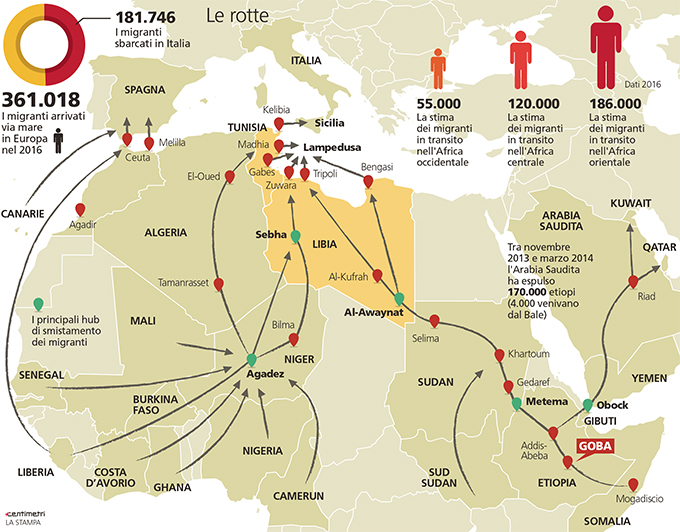taz | 09.02.2017
Das Urteil ist ein herber Schlag gegen Kenias Regierung, die Dadaab seit Jahren schließen will. In dem Lager leben 260.000 Menschen.
NAIROBI/FRANKFURT A.M. epd | Das Oberste Gericht in Kenia hat die Schließung des Flüchtlingslagers Dadaab verboten. Die Entscheidungsträger in der Regierung hätten mit der Anordnung ihre Befugnisse überschritten, urteilte Richter John Mativo laut kenianischen Medienberichten vom Donnerstag. Der Richter sprach sich auch gegen die Abschiebung der in Dadaab lebenden Flüchtlinge aus. Dies wäre verfassungswidrig und diskriminierend. Das Urteil ist ein herber Schlag gegen Kenias Regierung, die seit Jahren versucht, das Lager zu schließen. In Dadaab, einem der größten Flüchtlingscamps der Welt, leben 260.000 Menschen, vornehmlich Somalier.
Amnesty International begrüßte die Entscheidung des Gerichts. „Heute ist ein historischer Tag für mehr als eine Viertel Million Flüchtlinge, die Gefahr liefen, zur Rückkehr nach Somalia gezwungen zu werden“, erklärte die Ost-Afrika-Direktorin der Organisation, Muthoni Wanyeki. In Somalia drohe den Rückkehrern, Opfer von Menschenrechtsverletzungen zu werden. „Dass die unmittelbar bevorstehende Schließung Dadaabs angehalten wurde ist ein entscheidender erster Schritt hin zu Respekt und Schutz von Flüchtlingsrechten in Kenia.“ Jetzt müsse das Land mit der Staatengemeinschaft eine Lösung für die Flüchtlinge finden.
Die Regierung vermutet unter den Flüchtlingen Mitglieder der somalischen Al-Shabaab-Miliz und gibt Sicherheitsbedenken als Begründung für die Schließung an. Die Shabaab verübt immer wieder Anschläge in Kenia, das die Islamisten im Nachbarland im Rahmen einer afrikanischen Mission bekämpft. In Somalia beherrscht die Miliz weite Teile des Landes.
Richter Mativo beschrieb die Anordnung, Dadaab zu schließen, als unverhältnismäßig und willkürlich. Zwei kenianische Menschenrechtsorganisationen hatten gegen die Schließung geklagt. Dadaab sollte nach einer Anordnung der Regierung vom Mai 2016 bereits am 30. November geschlossen werden. Die Behörden verschoben die endgültige Schließung jedoch aus „humanitären Gründen“ um sechs Monate.
:::::
Al Jazeera | 09.02.2017
Kenya court quashes government order to close Dadaab
Kenya’s high court declares government order to close world’s biggest refugee camp „null and void“.
Kenya’s high court has said it would be unconstitutional to close the world’s biggest refugee camp, which houses more than 200,000 people who have fled war in neighbouring Somalia.
In a ruling on Thursday, the court said a government order to shut the camp, which would have sent the refugees back to Somalia from the sprawling Dadaab camp, was illegal.
Judge John Mativo, who issued the ruling, said Kenya’s internal security minister had abused his power by ordering the closure of the camp, which borders Somalia, in May last year.
According to Mativo, the order had been given without consulting the people who would be directly affected by its implications, which was a violation of Kenya’s constitutional right to fair legal proceedings.
„Hence, the said decision is null and void,“ he ruled.
Mativo also said that the order was discriminatory in nature and went against international treaties that protect refugees from being forced to return to persecution, adding that the Kenyan government had failed to prove Somalia was safe enough for the refugees.
Speaking to Al Jazeera, Amnesty International’s Deputy Regional Director Michelle Kagari, said a durable solution should be explored for Somali refugees.
„This would include for example, exploring options for Somalis to be integrated into local communities, it would also include exploring options to increase resettlement opportunities for Somali refugees,“ she said.
The ruling also blocked a government decision to disband the Department for Refugee Affairs.
Amnesty International’s East Africa chief, Muthoni Wanyeki, hailed the ruling as „historic“.
He said: „Today is a historic day for more than a quarter of a million refugees who were at risk of being forcefully returned to Somalia, where they would have been at serious risk of human rights abuses.“
„This ruling reaffirms Kenya’s constitutional and international legal obligation to protect people who seek safety from harm and persecution.“
The government had been planning to shut down Dadaab for more than six months. In June, Somalia’s ambassador to the US critisised the plan and said it would damage relations between Kenya and Somalia.
„Many parts of southern Somalia remain under the control of al-Shabab militias and there are almost daily clashes between them and Somali government forces, and African Union peacekeepers,“ Al Jazeera’s Mohammed Adow, reporting from the Somali capital Mogadishu, said.
„If these people [refugees] were to be repatriated back here, they will be coming back to what is essentially a war zone.“
The government had denied that it would be abandoning refugees, saying it had made arrangements with the Somali government to resettle them.
In November, the closure was delayed by six months after calls by foreign nations to postpone it on humanitarian grounds.
Kenya says Dadaab has become a hive for the al-Shabab armed group, and that it is a drain on the economy.
Some refugees have voluntarily returned to Somalia in recent months, after pressure to close down the camp spread fear of being forcibly evicted among the residents of Dadaab.

